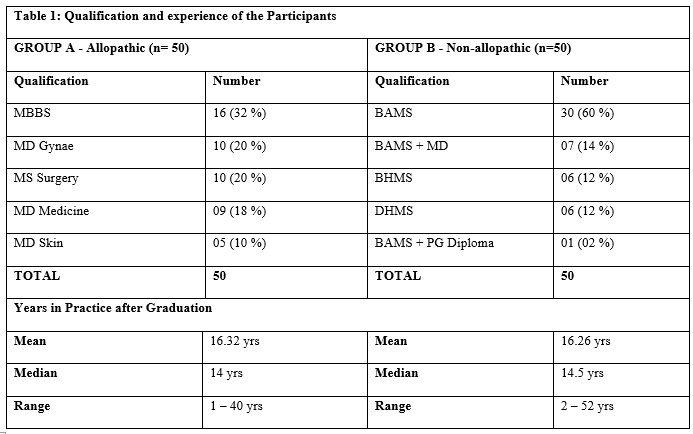Awareness and Opinion regarding Syndromic approach towards STI/RTI management among private practioners in Patiala, north India
Abstract
Introduction: Sexually Transmitted Infections (STIs) and Reproductive Tract Infections (RTIs) have been a major public health problem in all the developing countries. STDs and their complications are amongst the top five disease categories for which adults seek health care. The health-seeking behaviour among the general population in India shows that for STI/RTI treatment people prefer non-modern medicine private practitioners.
Aims and objectives: 1) To determine awareness and opinion regarding syndromic approach towards STI / RTI case management among the practitioners in private sector. 2) To compare the results with the previous large scale studies and to provide suitable recommendations.
Material and methods: This cross sectional study was carried out in urban Patiala in 2012-13 among 100 randomly selected private practioners by personal visiting and getting responses to a set questionnaire. Group A constitutes allopathic and group B constitutes non allopathic practioners.
Results and observations: 60% in Group A and 38% in Group B admit to be aware of syndromic approach but only 16 in Group A and 4 in Group B had correctly replied about no. of kits available in syndromic approach. 70% in both the groups were of the opinion that it will generate better follow up while 35-40% believe there is a risk of over treatment with this approach. Discussion: Since, practice of syndromic case management of STIs is presumed to be dependent on the practioners individual opinion and attitude hence it is beneficial to know about their opinion. To raise the rates of treatment as per WHO advised strategy of Syndromic management, confidence building and appropriate knowledge to the health care providers is a must.
Conclusion: Apparent need is there for regular educational activities for licensed private practioners as short trainings, CME, seminars on standard treatment protocols.
Downloads
References
2. S Hawkes and K G Santhya.Diverse realities: sexually transmitted infections and HIV in India. Sex Transm Infect. 2002 Apr;78 Suppl 1:i31-9.
3. AIDS in India; History and statistics. Internet source Available online http://www.avert.org/aidsindia.html (Accessed on 20th September 2011)
4. National AIDS Control Program Phase III (2006-2011) Strategy and Implementation Plan; National AIDS Control Organization, Ministry of Health & Family Welfare, Government of India; November 30, 2006;13
5. Regional health sector strategy on HIV, 2011–2015. WHO – SEARO. Available online http:// http://www.searo.who.int/about/administration_structure/cds/HIV-AIDS_Reg_Health_Sector_Strategy_HIV_2011-2015.pdf(Accessed on 30th April 2016)
6. WHO Report - WHO Country Cooperation Strategy- India health development, 2007 Aug. Available online http://www.searo.who.int/LinkFiles/WHO_Country_Cooperation_Strategy_-_India_Health_Development_Challenges.pdf(Accesed on 15th October , 2013)
7. USAID (2008) Country Health Statistical Report- India. Available online http://pdf.usaid.gov/pdf_docs/PNADN640.pdf
8. E. McCarthy, J. Beals, J. Haffey, L.R. Lugo, and S.A. Harvey. 2010. India STI case study: Diagnostic Services for Sexually Transmitted Infections in Three Indian States. Bethesda, MD: Center for Human Services. Available online : http://www.churc.org/chsprojects/Gates/India%20STI%20Case%20Study%20final.pdf
9. Bhavsar R D, Singh J P, Khanna A. Determinants of STIs/RTIs among women in Punjab and their health seeking behaviour. Indian Institute of Health Management Research;1998-99
10. Mignone J, Washington RG, Ramesh BM et al. Formal and informal sector health providers in southern India: role in the prevention and care of sexually transmitted infections, including HIV/AIDS. AIDS Care. 2007 Feb;19(2):152-8.
11. Mertens TE, Smith GD, Kantharaj K, Mugrditchian D, Radhakrishnan KM; 1998 .Observations of sexually transmitted disease consultations in India.World Health Organisation,Public Health. 1998 Mar;112(2):123-8
12. Philip PS, Benjamin AI, Sengupta P. Prevalence of symptoms suggestive of reproductive tract infections/sexually transmitted infections in women in an urban area of Ludhiana. Indian J Sex Transm Dis. 2013 Jul;34(2):83-8. doi: 10.4103/0253-7184.120537.
13. Dr. T. Rajaretnam et al;October, 2004.Baseline Survey report, assessment of practice of STI and HIV/AIDS Care by medical practioners in Karnataka. Population Research Centre, JSS Institute of Economic Research; Vidyagiri, Dharwad.
14. SUMMARY REPORT: Health Care Provider Survey in Gujarat, India; Gujarat state AIDS control society, part of a series of baseline surveys conducted to monitor the impact of HIV/STI prevention programmes in five states of India: Andhra Pradesh, Gujarat, Kerala, Orissa, West Bengal and in the Healthy Highways Project; 2001
15. Khandwalla HE, Luby S, Rahman S. Knowledge, attitudes, and practices regarding sexually transmitted infections among general practitioners and medical specialists in Karachi, Pakistan. Sex Transm Infect. 2000 Oct;76(5):383-5.

Copyright (c) 2016 Author (s). Published by Siddharth Health Research and Social Welfare Society

This work is licensed under a Creative Commons Attribution 4.0 International License.


 OAI - Open Archives Initiative
OAI - Open Archives Initiative


